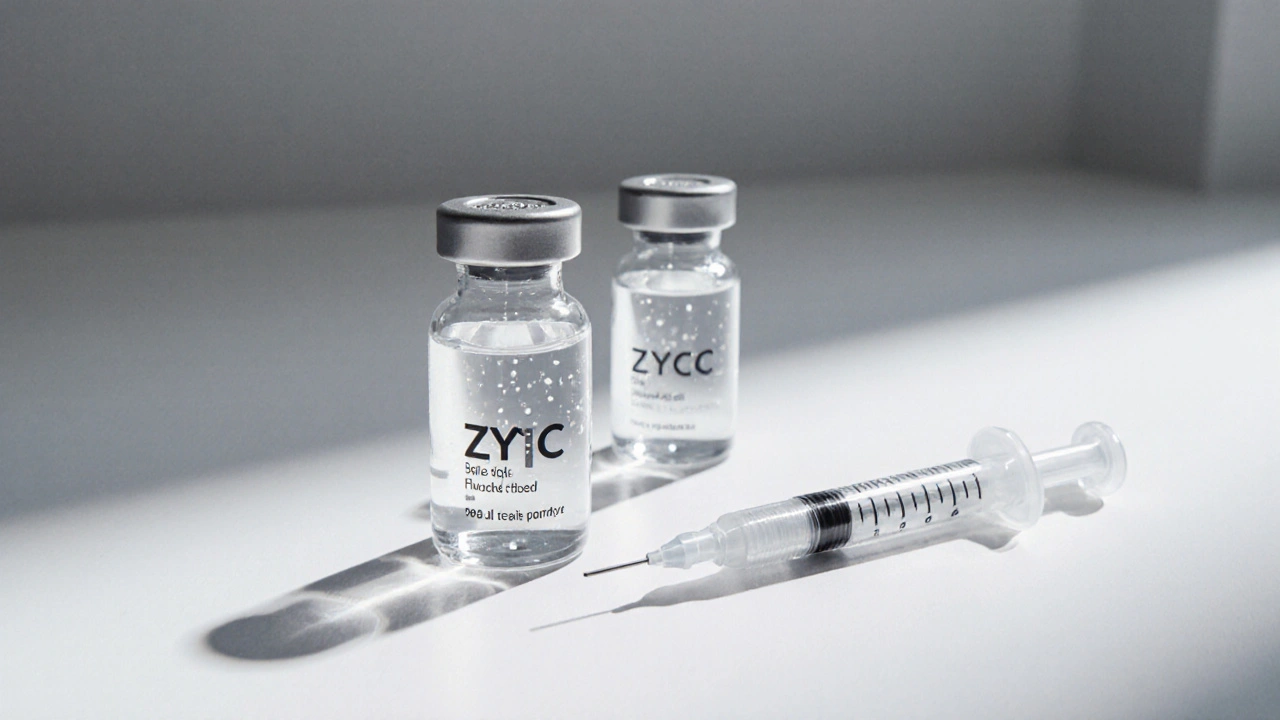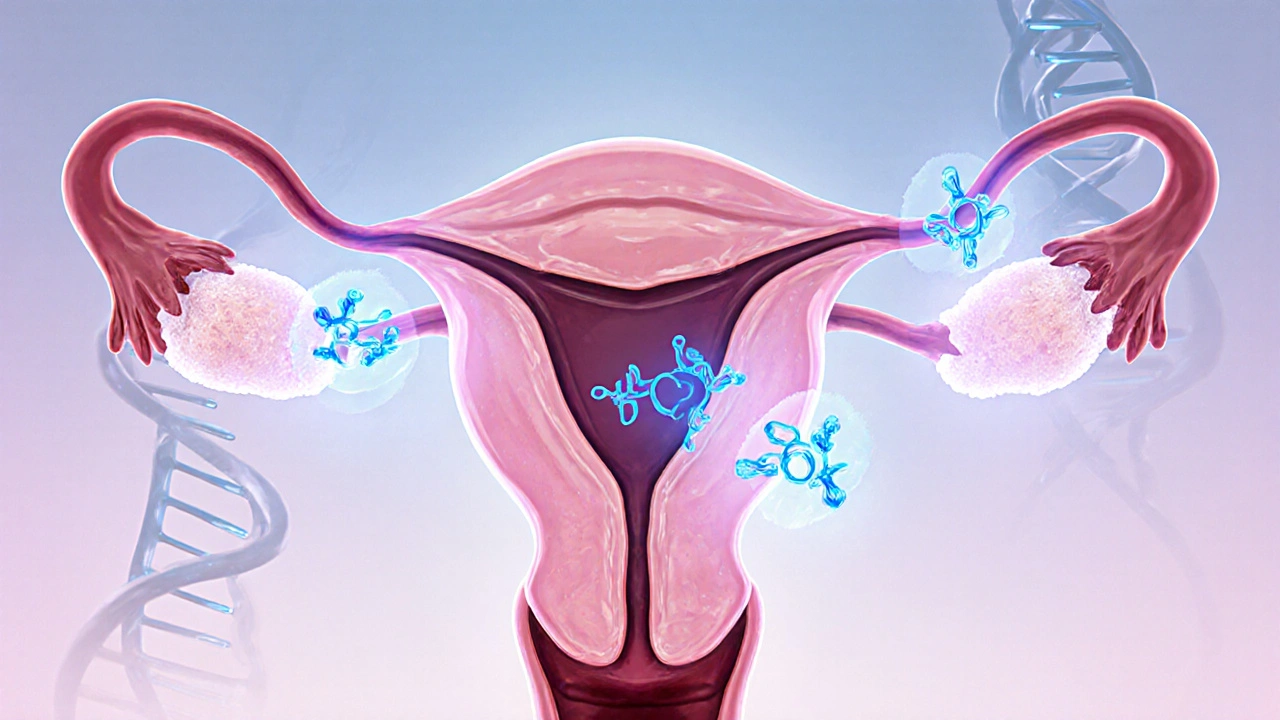ZyhCG vs Other HCG Products: Compare Benefits, Costs, and Risks
 Oct, 13 2025
Oct, 13 2025
HCG Product Cost & Benefit Calculator
Compare HCG Products
Calculate costs and benefits for your specific needs using this tool.
Your Inputs
Product Comparison
ZyhCG
High purity (98%), EU-GMP certified, FDA-imported
Generic HCG
90-95% purity, FDA-registered (US pharmacy)
Nova HCG
Recombinant, Australian-based, 10,000 IU syringes
Your Results
Total Hormone Needed
Recommended Product
Cost Comparison
Key Considerations
If you’ve been looking at HCG supplements for fertility or weight‑loss, you’ve probably stumbled on the brand name ZyhCG. The market is crowded with generic versions, imported labels, and a handful of premium brands. Knowing which product actually delivers the hormone you need, at the price you can afford, can feel like a maze.
What Is ZyhCG?
ZyhCG is a pharmaceutical‑grade human chorionic gonadotropin (HCG) product that advertises high purity, USP‑verified potency, and a supply chain that meets European Good Manufacturing Practice standards.
It is sold in 5,000 IU vials for injection and is often used in protocols that combine low‑calorie diets with hormone support. The brand claims a 98% purity level, which it says reduces the risk of inactive filler proteins that can cause immune reactions.
Human Chorionic Gonadotropin (HCG) - The Hormone Behind the Buzz
Human Chorionic Gonadotropin (HCG) is a peptide hormone produced by the placenta during pregnancy. In clinical settings it mimics luteinizing hormone (LH), prompting the ovaries to release eggs and supporting the corpus luteum to secrete progesterone.
Beyond fertility, HCG gained attention for its role in the “HCG diet,” a short‑term calorie‑restriction plan that relies on the hormone’s ability to mobilise stored fat. While the diet’s popularity is controversial, the hormone itself is FDA‑approved for specific medical indications, such as treating infertility and certain hormone deficiencies.
Key Criteria to Compare HCG Products
- Purity & potency - Measured in International Units (IU) per vial and verified by third‑party labs.
- Regulatory status - Whether the product is FDA‑registered, imported under a compassionate‑use license, or classified as a dietary supplement.
- Source & manufacturing - Recombinant vs. urinary‑derived hormone, and the geographic location of the production facility.
- Cost per IU - Real price after accounting for shipping, taxes, and any bulk‑discount options.
- Delivery format - Vial for injection, nasal spray, or sub‑lingual tablets.
- Side‑effect profile - Frequency of reported reactions such as injection site pain, ovarian hyperstimulation, or allergic responses.
ZyhCG vs Generic HCG
Generic HCG refers to unbranded hormone that is typically sourced from the same urinary extraction process used for many U.S. medical brands. The main differences are in quality control and packaging.
| Feature | ZyhCG | Generic HCG |
|---|---|---|
| Purity | 98% (USP‑verified) | 90‑95% (varies by supplier) |
| Regulatory label | EU‑GMP, FDA‑imported | FDA‑registered (if purchased from US pharmacy) |
| Cost per 5,000IU | $45‑$55 | $30‑$40 (excluding shipping) |
| Packaging | Glass vial with nitrogen‑flushed seal | Plastic vial, often without inert gas |
| Reported side‑effects | Low (0.5% mild irritation) | Higher (1‑2% mild to moderate) |
For users who prioritize guaranteed potency and low‑risk formulations, ZyhCG’s higher price may be justified. Budget‑conscious patients who are comfortable sourcing from reputable US pharmacies might find generic options equally effective.

ZyhCG vs Nova HCG
Nova HCG is an Australian‑based brand that markets a “premium” recombinant HCG. It is sold primarily in 10,000IU pre‑filled syringes.
- Recombinant vs urinary - Nova uses recombinant DNA technology, which eliminates the need for human urine as a source, theoretically reducing allergen risk.
- Dosage flexibility - Larger vial size can be split, but may require dilution steps that introduce error.
- Price point - Around $80 for a 10,000IU pack, translating to $8 per 1,000IU, higher than ZyhCG’s $9‑$10 per 1,000IU when accounting for shipping.
Patients with known sensitivities to urinary‑derived HCG often prefer recombinant brands like Nova. However, the clinical difference in efficacy is minimal for most fertility cycles, making ZyhCG a cost‑effective alternative with comparable outcomes.
ZyhCG vs HCG International
HCG International is a UK‑based distributor that offers HCG sourced from both urinary and recombinant processes. Their key selling point is a “rapid‑release” tablet form.
- Form factor - Tablets are convenient but have lower bioavailability (≈60%) compared to injectable forms (≈95%).
- Regulatory clarity - The brand operates under a “research only” label in many countries, which can cause customs delays.
- Cost comparison - A pack of 30×250IU tablets costs about $35, equating to roughly $4.70 per 1,000IU, which looks cheap but delivers less hormone per dose.
If you need a discreet, non‑injectable option and are willing to accept a lower absorption rate, HCG International’s tablets might work. For protocols that rely on precise dosing-like assisted reproductive technology-injectable ZyhCG remains the more reliable choice.
Regulatory Landscape: The Role of the FDA
FDA (U.S. Food and Drug Administration) classifies HCG as a prescription medication for specific indications. Many online sellers list HCG as a “dietary supplement,” which technically violates FDA regulations.
When a product is imported under a “personal use” exemption, the FDA may allow entry but can seize the shipment if it appears mislabeled. ZyhCG complies with EU‑GMP standards and provides a certificate of analysis that satisfies both EU and U.S. import requirements, reducing the risk of customs hold-ups.
Dosage Guidelines: How Much HCG Do You Really Need?
Dosage recommendations vary widely based on the intended use.
- Fertility cycles - Typical protocols prescribe 5,000-10,000IU subcutaneously or intramuscularly once every 2-3 days, starting on day 2 of the menstrual cycle.
- Weight‑loss diet - The controversial protocol uses 125-250IU daily for 3‑4 weeks, paired with a 500‑calorie diet.
- Men’s testosterone support - Some clinics use 250-500IU twice weekly to stimulate endogenous testosterone production.
Accurate measurement is crucial; a 0.5mL syringe calibrated for 1,000IU will give you a 5% margin of error, which is acceptable for most regimens. Over‑dosing can lead to ovarian hyperstimulation syndrome (OHSS) in women or estrogenic side‑effects in men.

Side‑Effect Profile: What to Watch For
While HCG is generally well tolerated, potential reactions include:
- Injection site pain or bruising.
- Mild headache or fatigue during the first few days.
- In women, ovarian cyst formation or OHSS if dosed too aggressively.
- In men, temporary gynecomastia if testosterone spikes are excessive.
Because ZyhCG’s purity is high, allergic responses to carrier proteins are rare. Generic and some foreign brands report slightly higher rates of mild irritation, likely due to residual contaminants.
Quick Decision Checklist
- Do you need injectable HCG for a fertility cycle? → Choose ZyhCG or a reputable FDA‑registered generic.
- Are you highly price‑sensitive and can manage shipping logistics? → Generic HCG may be cheaper.
- Do you have a known sensitivity to urinary‑derived hormones? → Consider recombinant Nova HCG.
- Do you prefer a non‑injection format despite lower absorption? → HCG International tablets.
- Is regulatory certainty a top priority? → ZyhCG’s EU‑GMP certification and FDA‑compatible documentation give peace of mind.
Common Mistakes and How to Avoid Them
Skipping the certificate of analysis - Always request a COA that lists purity, batch number, and expiration date. Without it, you can’t verify what you’re actually injecting.
Mixing dosage forms - Combining tablets with injections in the same cycle can lead to unpredictable hormone levels.
Using outdated vials - HCG loses potency after 12 months, even when refrigerated. Check the manufacture date before using.
Final Thoughts
Choosing an HCG product boils down to three core questions: how much do you trust the source, what form works best for your regimen, and how much are you willing to spend for guaranteed purity? ZyhCG ranks high on source trust and purity, sits in the middle of the price spectrum, and offers the injectable form most clinicians prefer.
Frequently Asked Questions
Is ZyhCG approved by the FDA?
ZyhCG is produced under EU‑GMP standards and is imported into the United States with a certificate that satisfies FDA import requirements. However, it is not directly FDA‑approved as a prescription drug; it is sold as a prescription‑only product in many countries.
How does recombinant HCG differ from urinary HCG?
Recombinant HCG is created using DNA technology, eliminating the need for human urine as a source. This usually results in higher purity and lower risk of allergic reactions. Urinary HCG, like ZyhCG, is purified from donated urine but undergoes rigorous filtration to reach similar purity levels.
Can I use ZyhCG for the HCG diet?
Technically yes, the same dosage (125-250IU daily) is used in the diet protocol. Keep in mind that medical societies consider the diet unsupported by strong evidence and it may carry health risks. Always consult a healthcare professional before starting.
Which product offers the best value for fertility treatments?
If you prioritize purity and regulatory documentation, ZyhCG provides a solid balance of cost and quality. For patients who have insurance coverage for prescription drugs, a reputable FDA‑registered generic may be cheaper while still meeting clinical standards.
How should I store my HCG vials?
Store vials at 2‑8°C (36‑46°F) in the refrigerator. Avoid freezing. Once reconstituted, use within 30 days and keep refrigerated.
Dan Tourangeau
October 13, 2025 AT 14:08Make sure you always ask for the certificate of analysis - it lists the batch number, purity, and expiration date, which helps confirm you’re getting what the label claims.
Bernard Valentinetti
October 20, 2025 AT 12:48Ah, the very essence of purity, a metaphysical tapestry woven from the strands of regulatory compliance; one cannot simply glance at a price tag without contemplating the ontological implications of bio‑ethical procurement! 🌟🤔
Kenneth Obukwelu
October 27, 2025 AT 10:28Indeed, when we trace the lineage of HCG from the placenta to the vial, we uncover a saga of scientific rigor that whispers promises of both fertility and weight loss - a narrative worth sharing with every hopeful patient.
Ria M
November 3, 2025 AT 09:08Consider, if you will, the alchemy of molecular fidelity: 98 % purity is not merely a statistic but a covenant between chemist and clinician, an oath that the hormone will act with the grace of a well‑composed sonnet rather than the clamor of a discordant chorus.
Caleb Ferguson
November 10, 2025 AT 07:48For clinicians weighing cost versus quality, note that ZyhCG’s per‑IU price hovers around $0.009, whereas generic options sit near $0.007; the marginal premium buys EU‑GMP documentation, which can smooth import clearance.
Delilah Jones
November 17, 2025 AT 06:28That price difference isn’t huge, but when insurance covers a prescription, the extra paperwork for a generic can actually delay treatment.
Pastor Ken Kook
November 24, 2025 AT 05:08Exactly! 🙌⏱️ Sometimes the bureaucracy‑laden path to a generic feels like a marathon, while ZyhCG arrives like a sprint-ready when you need it.
Nikita Warner
December 1, 2025 AT 03:48In practice, it is advisable to verify the storage conditions stipulated by the manufacturer; maintaining the vials at 2‑8 °C ensures potency throughout the treatment cycle, thereby minimizing the risk of sub‑therapeutic dosing.
Liam Mahoney
December 8, 2025 AT 02:28YoU dOnT nEeD tO wOrRy aBoUt tHe pRiCe, itS aLwaYs a sHoRtCeIn tHe sYstem, wHen tHe reAl sHit iS tHe cOnfUsEd pHarMaCeUtIcAl sTaLuE oF thE mArKeT!!
Justin Ornellas
December 15, 2025 AT 01:08While your enthusiasm is noted, the sentence above suffers from erratic capitalization, misplaced commas, and a lack of syntactic coherence; a more disciplined construction would enhance readability and authority.
Eric Appiah Tano
December 21, 2025 AT 23:48Let’s channel that energy into something constructive-focus on comparing the COA details side‑by‑side; the clarity you gain will empower patients to make informed choices without the noise.
Jonathan Lindsey
December 28, 2025 AT 22:28It is with a measured degree of sardonic appreciation that I observe the perennial debate surrounding HCG procurement; one might argue that the discourse, replete with fervent endorsements of ZyhCG’s alleged superiority, borders upon a ritualistic invective rather than an evidence‑based analysis, thereby necessitating a return to the fundamentals of pharmacological scrutiny, wherein purity, batch consistency, and regulatory compliance are evaluated with the detached precision of a seasoned clinician, unencumbered by the seductive allure of marketing hyperbole, and it is within this context that we must appraise the relative merits of each formulation, recognizing that the marginal cost differential may be rendered moot should a practitioner prioritize patient safety above all else.
Josephine hellen
January 4, 2026 AT 21:08First, I want to commend everyone who has taken the time to dissect the nuances of HCG products, because informed decisions are the cornerstone of successful outcomes. The journey from reading a product label to actually administering the hormone can feel like navigating a labyrinth, especially when faced with a sea of conflicting information. Your diligence in seeking certificates of analysis demonstrates a commendable commitment to safety and efficacy. By prioritizing high‑purity preparations such as ZyhCG, you are already minimizing the risk of unwanted immune reactions that could jeopardize a fertility cycle. Moreover, the EU‑GMP certification provides an additional layer of confidence, assuring that manufacturing practices meet rigorous international standards. When cost concerns arise, remember that the long‑term savings derived from reduced side‑effects and fewer repeat cycles often outweigh the modest price premium. It is also worthwhile to consider the logistics of storage; keeping vials refrigerated as instructed preserves potency, thereby ensuring each dose delivers the intended therapeutic effect. For those on a weight‑loss regimen, consistency in dosing is paramount, as fluctuations can undermine metabolic adaptations. In the realm of testosterone support, the subtleties of dosing frequency can influence hormonal balance, making precise measurement essential. I urge you to maintain a meticulous log of administrations, noting the exact IU delivered and any observable reactions. Such documentation not only aids personal tracking but also equips your healthcare provider with actionable data. Should you ever encounter a discrepancy in vial labeling or COA details, do not hesitate to contact the supplier for clarification. Transparency from manufacturers is a hallmark of reputable brands, and any hesitation should be treated as a red flag. Lastly, remember that the human element-communication with your clinician, adherence to prescribed protocols, and emotional support-plays an equally vital role in the success of any HCG‑based program. Stay optimistic, stay vigilant, and may your endeavors be met with the positive outcomes you seek.
Michelle Tran
January 11, 2026 AT 19:48Looks solid 👍
Gary Giang
January 18, 2026 AT 18:28The concise endorsement carries an understated affirmation, a subtle nod to the product’s credibility, which, though brief, resonates with a quiet confidence.
steve wowiling
January 25, 2026 AT 17:08Wow, look at that, we’re all getting poetic about a hormone-who knew a little vial could spark such epic prose? 😂